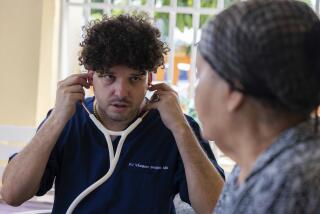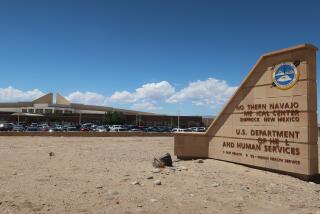A People’s Healer : Understanding Patients’ Cultures, Earning Their Trust Are Essential to Community-Based Health Care
Carlos: I left El Salvador for political reasons. Because of my work with the Catholic Church, I was considered dangerous to the government. At home, I was an M.D. with a family practice. I’m not planning to get my American license because, except for getting rich, I wouldn’t be doing anything I don’t do already. I don’t want to get rich. I want to fulfill my mission and serve my people. I can do that as a physician’s assistant.
Janine: Physician’s assistants are permitted to see patients, do histories and physicals, make diagnoses and provide treatment. They do this in conjunction with the license of the medical director. It’s a wide scope of practice, like a nurse practitioner.
Carlos: We provide medication here for patients. I write the order and they get it at our dispensary. This is also done with the medical director’s permission. We see people mostly from Latin America, and also from the Philippines and China. African-Americans, too.
Sometimes it’s people who are here 10 years, are still suffering from adaptation syndrome. That means they come from smaller towns to live in this metropolis. There is a lot of noise and pollution and crime, and with it come problems for them. The majority of them are from families that have been torn apart, and they still miss their families back home.
So they are really suffering from anxiety, which translates into hypertension, muscle aches, insomnia, diabetes, gastritis and colon problems. It’s hard to treat this kind of patient because you have to find the reason for the problem. They don’t only need pills or injections; they need to resolve their problems to get really well.
On the other hand, we have families who have been reunited recently after years of separation. Children come and parents haven’t seen them for years. Sometimes, the mothers bring along with them children from other fathers. This causes a lot of conflict.
Some foods that are available in their old countries aren’t available here. And suddenly they have access to fast food, which they prefer because it’s easy. We see a lot of anemia and malnutrition.
In their old countries, people went to the medicine man, someone with traditional medicine and home remedies. When they come here, they self-medicate a lot. There are pharmacies that sell prescription drugs without a prescription. Or they can buy antibiotics on the street or go down to Tijuana. So people get really addicted to Valium and tetracycline.
Culturally, people think that an injection is better than if you take a pill. So I think this population is at high risk for AIDS.
Janine: People in the neighborhoods are identified as people who learned to give injections in the old country. So people buy the medication they think they need, and this person charges $5 and gives them an injection. And who knows what kind of sterilization techniques they use on the needles?
Carlos: Some home remedies are dangerous. People get lead poisoning because some of those medications, such as easarcon, which they take for diarrhea, have high levels of lead. There’s rattlesnake powder in capsules, and sometimes the capsules are contaminated with salmonella bacteria, which makes people sicker. They take these for cancer, arthritis and impotence. We’ve been trying to educate people not to do this.
People are really shy when they first come into the clinic. They aren’t used to this kind of medicine. They don’t believe in vaccines. There are older ladies who have never had a Pap smear or mammography. So we need to convince them to start having those tests.
Naturally, they resist in the beginning. But being from the same culture, speaking the same language, the same idioms, they feel they can trust me, and finally, they come to trust the physician and do what we prescribe. We try to be friendly and culturally sensitive, and I think that’s a big help.
One main focus of our practice is teaching preventive medicine, because we are trying to keep people from doing these dangerous practices. It’s hard, because the system here is a curative system--they want to pinch pennies.
Janine: We try to educate people on many levels. If we’re having an OB-GYN clinic, we have videos on sexually transmitted diseases, HIV and breast self-examination. We have hypertension management, parent education and sex education. The medical assistants, instead of just taking blood pressures, explain it all.
Carlos: My goal is to enlarge the clinic and work here as long as I can, serving the people I love.
More to Read
Sign up for Essential California
The most important California stories and recommendations in your inbox every morning.
You may occasionally receive promotional content from the Los Angeles Times.










